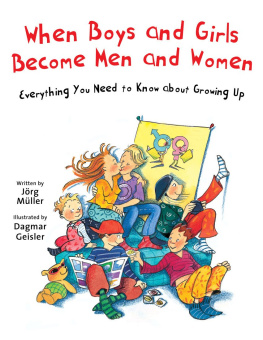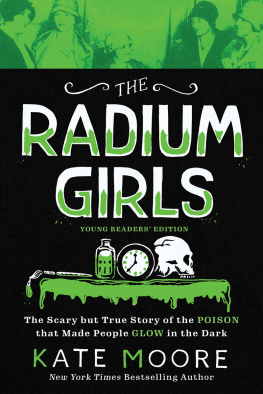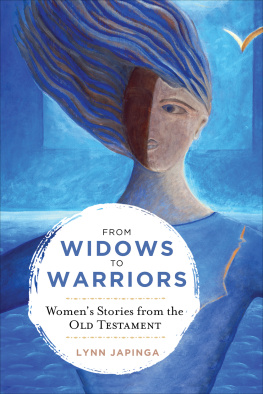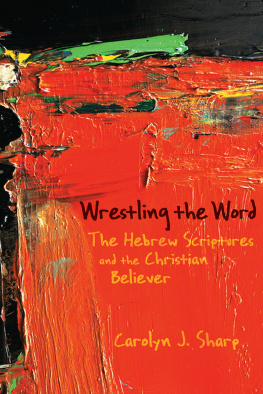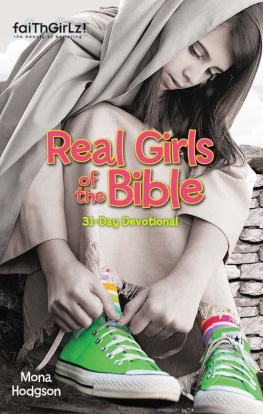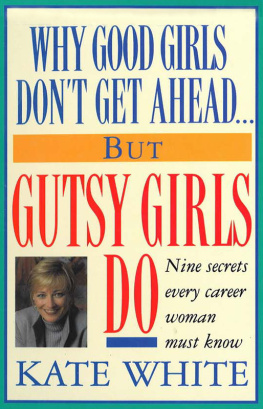Acknowledgments
I WOULD LIKE to thank my wonderful family, especially my children, Bob, Annie, and Jack for their continued love and support. I am also immensely grateful for the many friends who continue to grace my life with joy and encouragement. Special thanks to Walter Burr, the man who started it all; my agent, Rob McQuilkin; and editor, Sarah Stanton, for their enthusiasm and dedication to this important project. Finally, Id like to express my heartfelt gratitude to the faculty, staff, and especially the wonderful students at Salve Regina University, for their continued affirmation and prayerful support.
Rebekah: Lover and Liar
A Woman with a Plan
(Gen 24:1067; 26:616; 27:546; 28:57; 29:1213; 35:8; 49:31)
N ow Rebekah was listening when Isaac spoke to his son Esau. So when Esau went to the field to hunt for game and bring it, Rebekah said to her son Jacob, I heard your father say to your brother Esau, Bring me game, and prepare for me savory food to eat, that I may bless you before the Lord before I die. Now therefore, my son, obey my word as I command you. Go to the flock, and get me two choice kids, so that I may prepare from them savory food for your father, such as he likes; and you shall take it to your father to eat, so that he may bless you before he dies. But Jacob said to his mother Rebekah, Look, my brother Esau is a hairy man, and I am a man of smooth skin. Perhaps my father will feel me, and I shall seem to be mocking him, and bring a curse on myself and not a blessing. His mother said to him, Let your curse be on me, my son; only obey my word, and go, get them for me. So he went and got them and brought them to his mother; and his mother prepared savory food, such as his father loved. Then Rebekah took the best garments of her elder son Esau, which were with her in the house, and put them on her younger son Jacob; and she put the skins of the kids on his hands and on the smooth part of his neck. Then she handed the savory food, and the bread that she had prepared, to her son Jacob (Gen 27:517).
B IBLE READERS throughout the ages have delighted in the story of Rebekah, whose cleverness and single-minded devotion to her son, Jacob, ensures the continuation of Gods promise to Abraham. This promise (Gen 12:23) assures the acquisition of the land, an enduring relationship with God who will extol blessings upon future generations, and a proliferation of descendents. The second of the matriarchal figures, preceded by Sarah and followed by Rachel and Leah, Rebekah is one of the most highly developed characters in the Hebrew Bible. She is beautiful, resourceful, and strong-willed; but above all, she is a trickstera type of character in the Bible, both admired and respected in the ancient world for their skillful use of manipulation to bring about Gods plan.
Before we begin to explore Rebekahs story, a general comment regarding the stories of the patriarchs and matriarchs seems in order. In the past, there was a tendency to read the stories of the patriarchs and matriarchs (Abraham and Sarah; Isaac and Rebekah; Jacob and Rachel and Leah) from a strictly founding fathers, perspective. In recent years, however, scholars have recognized the important role the founding mothers played in Israels beginnings. It is clear that the biblical writers felt that the founding mothers were every bit as important (and some might argue even more important since it is often their actions that bring about Gods plan) in the formation of the people of Israel. How do we know this? First, the very fact that the matriarchs are included at all is noteworthy. Although the Bible did not invent patriarchy, it is nonetheless the social umbrella under which the women stories are written. To include womenalongside menin the foundational story of the nascent nation is therefore highly significant.
Second, all of the matriarchs, and many of the women associated with them, such as their maids, are named in the text. Since the overwhelming majority of women in the Hebrew Bible are not named, referred to instead as the wife, daughter, mother, or concubine of a named male (e.g., Noahs wife; Lots daughters; Samsons mother; Gideons concubine), or in association with a particular place, task, or function (e.g., the prostitute of Gaza; the maidens going out to draw water; the nurse of Joash) naming is a critical detail not to be overlooked.
Finally, the matriarchs are presented not as merely the wives of great men, but as movers and shakers in their own right, outwitting, outsmarting, and outmaneuvering many of the male characters in the stories. This is surely the case with Rebekah, who occupies a more commanding presence in the Bible than her husband, Isaac. It is Rebekah, not Isaac, who will go to great lengths to preserve the continuation of Gods promise to Abraham. With these important facts in mind, let us now turn to Rebekahs story.
Rebekah is the only woman in the Hebrew Bible whose birth is actually recordedcoming just after the terrifying tale of the binding of Isaac, and just before the mention of Sarahs death (Gen. 22:23). Placing her birth announcement between these two pivotal events not only situates her in the life of Isaac, but it is the biblical writers way of honoring her and elevating her to a position of great prominence.
Moreover, the connection between Abraham, considered the founder of the people of Israel, and his grandniece, Rebekah, also accents her important role in the unfolding story of Israel. For example, Rebekah, like Abraham, demonstrates great courage and faith, as she travels from her home in Mesopotamia to Canaan to face an uncertain future (Gen 12:1; and 24:4, 38, 6061). Both Abraham and Rebekah enjoy a personal, efficacious relationship with the Lordwho speaks directly to them and to whom they are dedicated. And, the same promise reiterated to Abraham is likewise promised to Rebekah (Gen 22:17; 24:60).
Rebekah also has much in common with her predecessor, Sarah. Like Sarah, she leaves her homeland and faces many years of barrenness before God bestows the blessings of children. Both Sarah and Rebekah are designated as their husbands sisters in order to save their respective husbands necks, when, in these remarkably similar tales, the promise is severely compromised by the patriarchs. In the first such story (Gen 12:1020), Abraham and Sarah journey to Egypt in search of food during a famine. Afraid that Pharaoh will kill him in order to take his wife, Abraham asks Sarah to pretend she is his sister. Pharaoh thinks Sarah is beautiful and brings her into his harem, giving Abraham a tidy sum for giving up his sister. God, however, is unhappy with this arrangement and, in a foreshadowing of the Exodus story, sends plagues upon Pharaoh. Understandably, Pharaoh is furious with Abraham, not to mention the plagues sent by Abrahams God, and kicks the two out of Egypt.
This type of story reappears in Genesis 20, but this time it is the Philistine King of Gerar, Abimelech, who pays off Abraham and brings the lovely Sarah into his home. Never mind the fact that Sarah is now well into her sixties, a minor biblical detail. In a dream, God tips off the king and Abrahams trickery is revealed.
In a strikingly similar story, Isaac and Rebekah migrate to Gerar to live among the Philistines during yet another famine, a common theme is the Bible, and because of Rebekahs beauty, Isaac, like Abraham, fears the townsmen may kill him in order to get his wife. Isaac passes off Rebekah as his sister, and all is well until the king of the Philistines looks out his window and witnesses Isaac fondling his sister and realizes the ruse (Gen 26:111).




